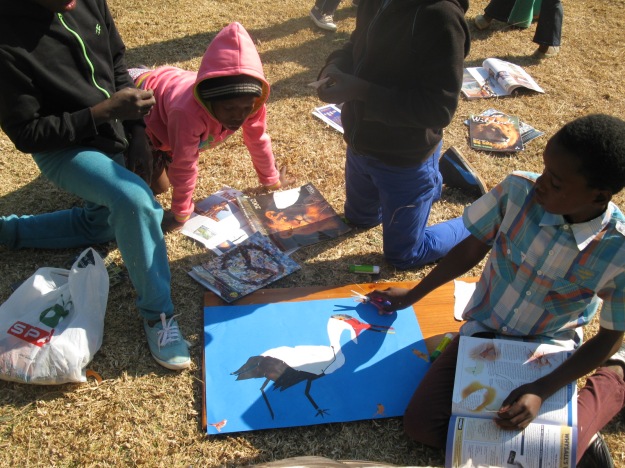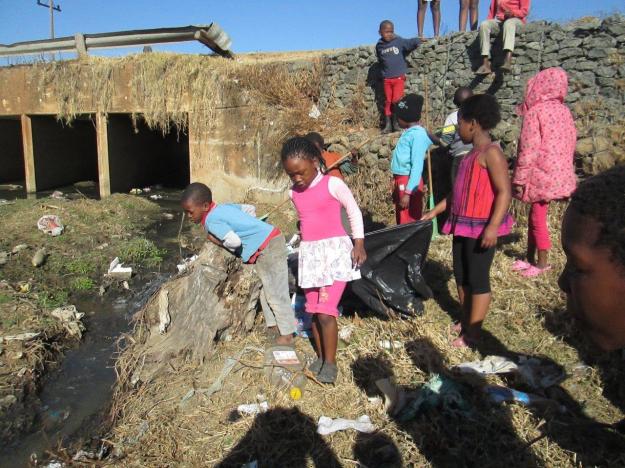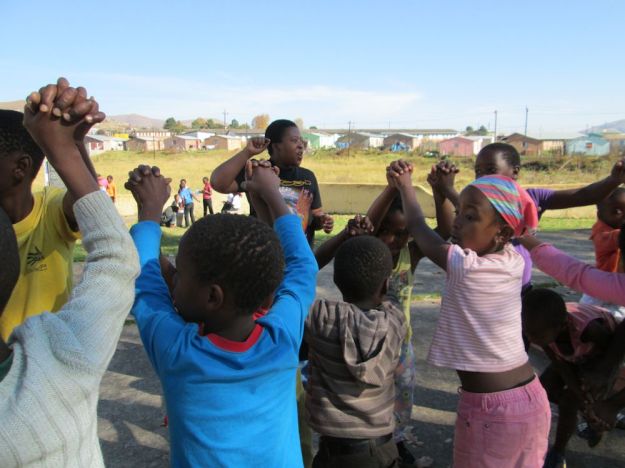From Mooi River to Mpophomeni, eco-conscious kids had heaps of fun in the sun while learning about important environmental issues and taking action too. Other Midlanders might have headed for far flung places to escape the cold and tick things off their bucket lists, but, actually, there is plenty to entertain one right here without expanding your carbon footprint.
Bruntville Imisebe Holiday Club members were fortunate to visit the Bill Barnes Crane and Oribi Reserve and began the day with some milo to warm up. They learnt all about Wattled Cranes and visited the new Chick Rearing Nursery situated on the edge of the dam, asking so many questions.
A two hour walk exploring the sunny grassland followed. Reed bucks were spotted running down the hill and they also saw a grey heron and a puffadder (for some it was the first time they had ever seen a snake) “We love our nature, but we didn’t know that there is lot of fun in the grassland and that animals need each just other like us.” Smanga Manyoni said with a laugh.
Hiking is a great way to warm up. These teenagers headed into the hills surrounding Mpophomeni to explore.
Discovering that there was all sorts of life even though the veld was dry
In many places, the grass had been burnt, but Aloe maculate was still flowering.
Using binoculars donated by N3TC, they were able to see for miles. “We can see Midmar so clearly” said Sihle Ngcobo. Everyone really enjoyed taking these photos with the camera donated by Sue Hopkins.
At the Bill Barnes Crane and Oribi Reserve, Beautiful Cranes Nature Club members brought along friends who were spending the holidays in the area.
After warm up games (really appreciated by the visitors from Durban!), Nkanyiso introduced the ‘feed the chicks’ activity. This activity teaches that both the mother and father crane share responsibility of feeding and looking after the chicks. This involves looking for their food and also placing it in their beaks. In groups some kids become ‘chicks’, while the ‘parent’ picked up leaves using the Wattled crane puppet and feed the chicks.
Using colours torn from old magazines, they all created very beautiful posters of the three SA crane species.
Each group had to share what they knew about their crane. All hands were in air and they answered correctly.
Learners were having fun interacting with one another and all three groups came up with beautiful posters of cranes and every one was happy.
In Mpophomeni the Kidz Club conducted a Clean Up in the uMthinzima stream near the library. They chose that spot because they are concerned that the dirty water pollutes Midmar dam.
They collected rubbish bags of from the river banks
and were startled to find a headless, dead cow in the stream.
Discussions afterwards focussed on the need to conserve water resources for future generations.
The Mpop Kidz Club gathers most Saturdays in the sunshine at the Nokulunga Gumede Memorial Wall.
The Club is facilitated by Mpophomeni Conservation Group members – Ayanda Lipheyana, Tutu Zuma and Zamile Mtambo. Their purpose is to help the kids understand the importance of respecting all living things in the environment and to use their creative skills to re-use waste and make useful things.
They plan a wide range of activities, which always begin with games to warm up on chilly winter mornings. Mfundo Msomi said “We learn to be responsible, by respecting one another.” Masiphile Madladla added “It is the first time since my mother died, that I am not feeling alone.”
They have learnt how to make skipping ropes from plastic bread bags (and tested them out, of course!),
and Eco-Bricks from waste plastic, which is very often burnt as the municipal refuse collection is really poor.
Nozipho Dladla comments “Mpop Kidz Club is the best. Yeh! Rich or poor, we are all one – like the sunshine that shines everywhere on everyone.”
In July, they invited the Mpophomeni Enviro Club (facilitated by MMAEP) to join them when Nkanyiso Ndlela of the KZN Crane Foundation came to visit. 50 children turned up for a day of fun and learning.
Nkanyiso did a presentation about the three African cranes using posters and shared that cranes are one of South Africa’s treasures – rare, precious creatures that have to be looked after. These special cranes have lived on our earth for millions of years. Over the ages, people thought about cranes as symbols of being faithful, good parents, bringing good luck and announcement of changing seasons.
As cranes depend on wetland and grassland habitats to breed and feed, everyone played the Windows on our World wetland picture building game to learn more about this habitat.
The Cranes in Crisis poster game helped learners to find out more about the things that cause cranes to become endangered, as well as what we can do to protect them. Learners were really focused and enjoyed this competition activity.
They also played the Crane Feeding game, learning about the dedication of BOTH parents to rearing their young.
“I like the crown crane because it is beautiful” said Amahle afterwards. Ayanda Lipheyana of the Mpophomeni Conservantion Group asked Nkanyiso to return next holiday saying “More crane lessons really needed as some of the learners had no clue about the cranes.”
Across the dam, in Dargle, the Nxamalala Holiday Club sponsored by Dargle Conservancy met to learn more about biodiversity, and have lots of fun.
Facilitator Gugu Zuma reports: We made animals using leaves & grass (glued onto paper and drew eyes). Then we played the Habitat card game to discover- where do creatures live? Is it Mammal, Reptile, Bird, Fish or Amphibian? Sort them into groups and look at where they live and their habitats – what they need to survive.
We ended with the biodiversity web game which teaches about needing other animals (not just about what eats what!). For example, a Baboon turn over rocks on the mountainside looking for insects to eat and this leaves a bare patch where seeds germinate and new plants can grow. From this we can deduce that without baboons there would be much less plant diversity.
”Today I learned a lot. I thought it was a good thing to kill birds but from now on I will never do it again. I am saving the birds for the next generation” Sabelo Zuma
What did you do during the winter holidays to inspire kids to care for our planet?

























Well done to all concerned!
LikeLike
This looked like so much of fun!
LikeLike
They are privileged children.
LikeLike